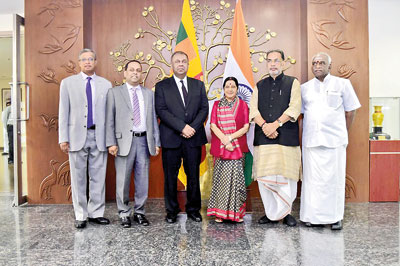News
New amendments to fisheries laws to deter poaching : Fisheries Ministry

The Sri Lankan delegation with the Indian delegation
The Fisheries Ministry is to introduce fresh amendments, including banning bottom trawling, into existing fishing laws as a key move to deter Indian poaching in Sri Lankan waters, officials said.
Key amendments to the existing Foreign Vessels Act have already been forwarded to the Attorney General’s (AG) Department for final approval and its constitutionality.
The proposed amendments include an increase of a fine, depending on the length of the vessel which engaged in fishing in Lankan waters without a valid licence issued by the Fisheries Department.
Meanwhile moves are underway to ban bottom trawling in Sri Lanka with the Government working out a time bound âroad mapâ to resolve the Indo-Lanka poaching dispute.
The proposed amendment says those who engaged in bottom trawling violating the provisions of the Fisheries Act will be subjected to two years of imprisonment or a fine of up to Rs. 50,000.
Ahead of ministerial talks, the Sri Lankan fishermen rejected outright a proposal that would allow Indian fishermen to fish in Sri Lankan waters for 83 days in a year for three consequent years as a grace period before they switch into deep sea fishing as an alternative way out in the Indo- Lanka poaching issue.
In addition to the rejection of the proposal, the Sri Lankan fishermen also demanded compensation from their counterparts for harmful practice of bottom trawling carried out in Lankan waters for so many years.
âThey have accepted bottom trawling is destroying the marine resources in the Palk Strait but request three more years of its practice before switching. By that time most of the rich marine resources might have gone. We have told them very clearly that we canât allow them to fish not even for three minutes,â Anthonipillai Mariyarasa, Leader of the Mullaitivu Fishermen’s Federation told the Sunday Times.
The Sri Lankan delegation also reminded the Indian fishermen of a similar agreement reached in 2010 which allowed them to fish for 80 days in a year for one year. They assured, meanwhile, that their harmful fishing methods including bottom trawling would be converted into marine environment friendly fishing but this was never practised.
The five- hour talks between the fishermen of the two countries failed to reach any substantial understanding as both parties firmly held to their positions.
Last week India agreed on policy to give up the bottom trawling practised by Tamil Nadu fishermen and assured the Sri Lankan ministerial delegation in New Delhi that it will take necessary steps with allocated funding to convert them to go for deep sea fishing instead.
A Joint Working Group (JWG) was set up at the ministerial talks in New Delhi talks comprising representatives from the Ministries of Foreign Affairs, the Coast Guards and navies of both countries.
âThe Indian delegation sought three years as a grace period to switch to deep fishing but we urged it to expedite that process to find a lasting solution for this issue,â delegation sources said.
Though Sri Lanka opposed the repeated requests of officials at the meeting to release some 130 fishing trawlers apprehended by the Navy and currently in Sri Lankan custody, the issue will only be discussed at the first JWG meeting.
The committee is mandated to end the practice of bottom trawling at the earliest and work out the modalities for the Standard Operating Procedures (SOPs) for handing over of apprehended fishermen, and ascertain possibilities for cooperation on patrolling. The committee is to meet on January 2 next year in Colombo when the Fisheries Ministers of both countries will hold a meeting to take forward the bilateral talks on the poaching issue.
Earlier a private member’s bill was submitted to Parliament seeking to ban bottom trawling, a harmful practice carried out by Indian fishermen in Lankan waters. The bill was submitted by Tamil National Alliance (TNA) Parliamentarian M. A. Sumanthiran who took part in the Sri Lankan ministerial delegation.
Though the bill was submitted to Parliament and is yet to be passed, the Northern Provincial Council (NPC) which studied the bill and conducted a debate in one of its sittings raised serious concerns.
It said the livelihood of families of almost 1800 trawler boat fishermen and their crew who are engaged in trawler fishing in Valvettiturai, Gurunagar and Mannar North have to be safeguarded before implementing the provisions of the Act.
âAlternate livelihood employment opportunities should be ensured before implementation of the Act and a sufficient period of time should be given to enable these families to acquaint themselves with the alternative opportunities provided,â the Council informed the Parliamentary Secretary in order to express the Council’s concurrence in the Act.

